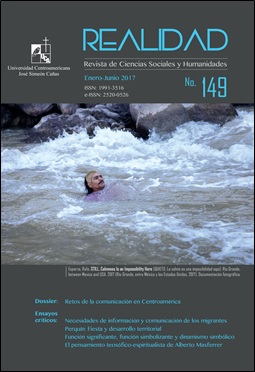Abstract
The recognition of the right to communicate in some Latin American countries has helped to achieve one of the demands that different agencies and international actors have positioned from the sixties as a strategic element related to the plurality and the democratic quality of societies. From an intersectional perspective, access to the right to communication from the new legislative frameworks in the region is an opportunity to dispute senses by those historically excluded from the mass media populations, such as indigenous and afrodescendant women. This article describes the right to communication as related to the construction of citizenship element, empowerment and social change is located, from the experience of two groups of afrodescendant and indigenous women in community radio stations of the Bolivarian Republic of Venezuela and Ecuador.
Realidad: Revista de Ciencias Sociales y Humanidades No. 149, 2017: 171-197

This work is licensed under a Creative Commons Attribution-NonCommercial 4.0 International License.
Copyright (c) 2017 María Cruz Tornay Márquez





